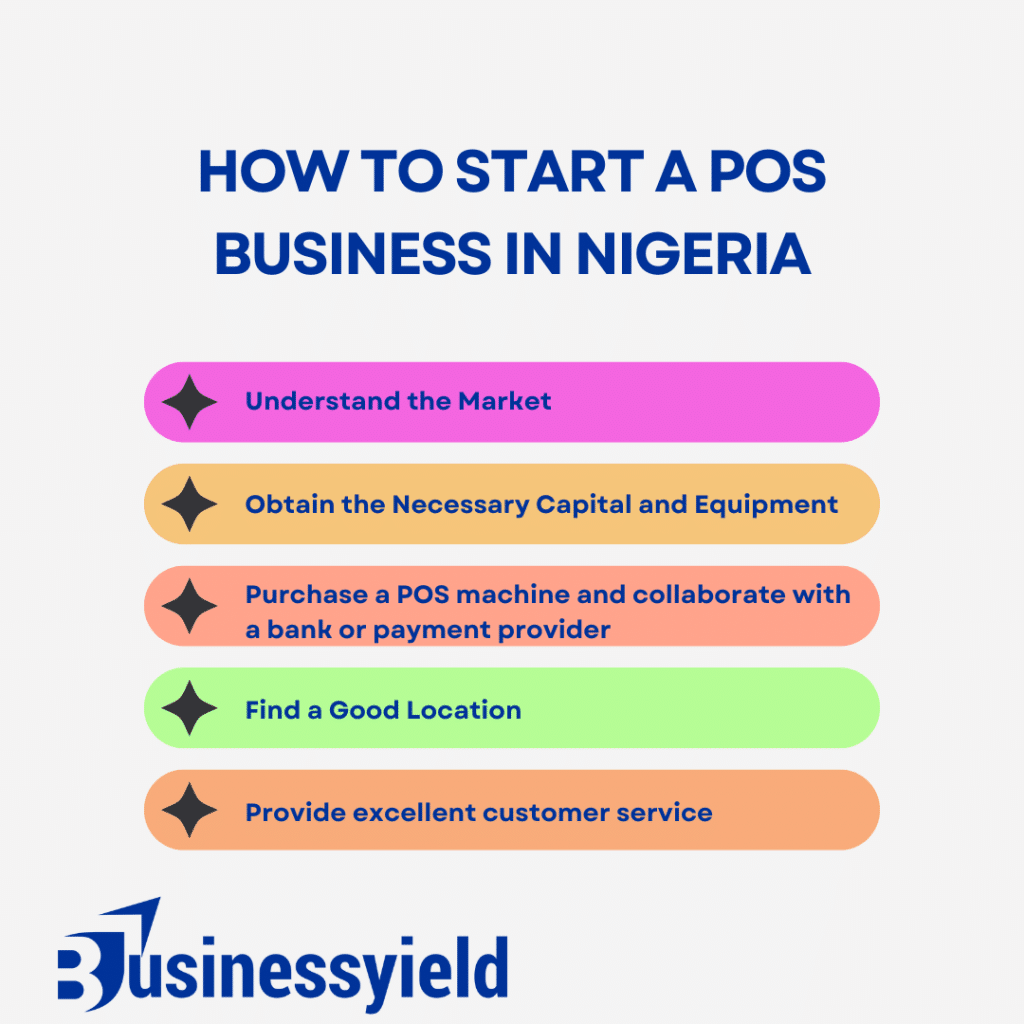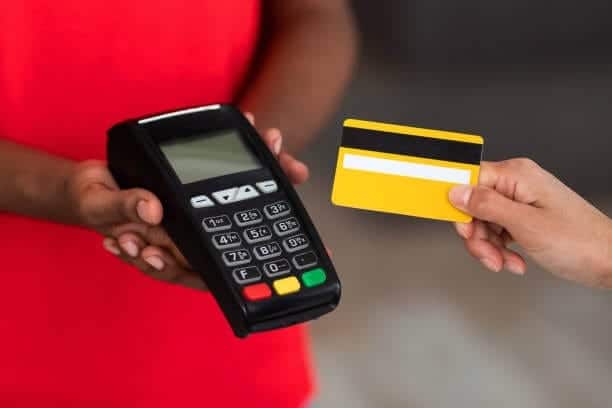Starting a POS business in Nigeria has become one of the most profitable undertakings, given the increased need for easy financial services in both urban and rural settings. If you want a step-by-step guide to starting a POS business in Nigeria, you’ve come to the perfect place. With the correct information and tools, you may easily enter this thriving market and offer critical services like cash withdrawals, deposits, and bill payments. In this comprehensive guide, I’ll walk you through everything you need to know—from being licensed to purchasing the appropriate equipment—so you can confidently establish and start your own POS business in Nigeria with success.
What is a POS business, and Why Should You Start One In Nigeria?
A POS business entails providing financial services to members of your community, such as cash withdrawals, transfers, bill payments, and airtime purchases. Consider it as bringing banking services closer to the people. While the term ‘POS’ normally refers to payment terminals used in businesses, in Nigeria, it has become synonymous with small business owners who provide these critical services.
The best part? You’re resolving a legitimate issue. For many Nigerians, particularly those living in rural regions, accessing a bank or an ATM entails long trips, hours of standing in line, or coping with network outages. As a point-of-sale operator, you save them time, money, and irritation.
So, let’s see how to get started.
How to Start a POS Business in Nigeria

#1. Understand the Market
Before you hurry into setting up your POS booth, you should research the market in your area. Are there any banks or ATMs nearby? What are the transaction fees from the other POS agents nearby? From personal experience, understanding what clients anticipate in terms of timeliness and transaction fees may make or break a firm.
Begin by engaging in conversation with those around you. Inquire about where they go for their banking requirements and what challenges they face. Take note of the demand for cash withdrawals and transfers, especially during high periods such as market days or weekends. Understanding your market will allow you to modify your offerings to fit local demands.
#2. Obtain the Necessary Capital and Equipment
A POS firm does not require a large sum of money to start, but it does demand some initial investment. Here’s what you’ll need.
- POS Machine: You’ll need a dependable POS machine, which you may get from First Bank, Access Bank, or any other renowned payment service provider, such as Paga, OPay, or Moniepoint. These companies supply their terminals for free or at a low fee, but you must meet their application conditions.
- Cash Float: This is the cash that will be used for withdrawals and other transactions. Depending on your area, a beginning float of ₦50,000 to ₦200,000 is usually necessary.
- Shop or Booth: You’ll need a secure space to operate, whether it’s a tiny shop, booth, or kiosk. The closer you are to markets, parking lots, or busy streets, the more clients you’ll attract.
#3. Purchase a POS machine and collaborate with a bank or payment provider
Once you’ve secured your funding, the following step is to acquire a POS machine. Most Nigerian banks, including Access Bank, First Bank, Zenith Bank, and UBA, provide POS terminals. Alternatively, you can engage with independent suppliers like OPay, Paga, or Flutterwave, who frequently have fewer cumbersome procedures than banks.
Most POS providers will want you to register, which usually entails providing your business registration (if applicable), acceptable identity, and proof of a bank account. Choose a provider with good customer service and little downtime.
#4. Find a Good Location
Your location is critical to the success of your point-of-sale business. Ideally, you should locate in regions with limited access to banks or ATMs, or in high-traffic areas such as markets or bus stations. In my neighborhood, most operators located near local markets or public transportation hubs experience consistent traffic throughout the day.
Safety is crucial. You do not want to work in an area where there is a high risk of theft or robbery. Consider installing a basic security camera or collaborating with a local security guard if needed.
#5. Provide excellent customer service
Nothing compares to exceptional customer service, in my experience. Smile, be friendly, and be prepared to explain how things operate to consumers who may be unfamiliar with the POS system. If there is a network outage or a service delay, be transparent with your customers. Trust me—establishing a devoted customer base will go a long way toward helping your company thrive.
How Much Can You Make with a POS Business in Nigeria?
In a busy location, a POS operator can earn between ₦5,000 and ₦15,000 daily profit. This may not seem like much, but it adds up over time. The key here is volume—process as many transactions as possible in a single day, and diversify your income stream by offering additional services such as bill payment and airtime sales.
The fees you can charge clients depend on your region and the payment provider you use. For every ₦1,000 withdrawal, you can charge between ₦100 and ₦200. Transfer fees vary from ₦50 ₦50 to ₦100, depending on the transaction size.
Increase Profits in Your POS Business in Nigeria
Maximizing earnings in a POS business needs more than just increasing transactions. Here are six strategies to increase your income and remain ahead of the competition:
#1. Provide Numerous Services
Extend your offers beyond withdrawals and transfers to include bill payments, airtime sales, utility payments, loan repayments, and betting services (where permitted). Diversification will bring in additional clients and enhance revenue streams.
#2. Reduce Transaction Fees
Lowering your transaction fees can increase your competitiveness, particularly in high-density locations. Offering slightly lower pricing than competitors encourages people to utilize your service, resulting in increasing volume and profitability over time.
#3. Leverage Multiple POS Machines and Networks
If you work in a busy area, consider investing in extra POS terminals to service more clients faster and reduce wait times. In addition, use machines that run on different networks (MTN, Glo, Airtel) to avoid downtime during network outages and provide continuous service.
#4. Increase Float and Expand to New Locations.
Maintaining a bigger cash float allows you to meet customer withdrawal requests without turning them down. Consider spreading your business to various high-traffic areas as it grows. Hire trustworthy employees to handle new sites, boosting your earnings without significantly raising overhead costs.
#5. Concentrate on Customer Retention
Building customer loyalty is critical to maintaining profitability. To attract return business, provide good customer service, be upfront about pricing, and keep a nice demeanor. Satisfied customers frequently refer others, allowing your firm to thrive without the need for more marketing.
#6. Optimize operating hours and marketing
Make sure your business is open during peak transaction times—early mornings, evenings, and weekends. Increase visibility through local marketing, posters, and signboards, and work with surrounding businesses to promote your services. The more visible and approachable you are, the more customers you will attract.
By applying these tactics, you can improve transaction volume, establish a loyal customer base, and progressively raise earnings.
Challenges You Might Face and How to Overcome Them
Running a POS firm is not without its challenges:
- Network Downtime: Network difficulties can cause transaction delays, resulting in dissatisfied consumers. Always have multiple networks (such as MTN and Glo) to fall back on if one fails.
- Security Risks: Carrying significant amounts of money is a security concern. To reduce this, make multiple bank deposits during the day and avoid storing significant sums of cash overnight.
- Rivalry: As more people enter the POS industry, the rivalry can be fierce. One method to stand out is to provide exceptional customer service and consider lowering transaction fees to attract more clients.
Where to Get POS Machines in Nigeria
Starting a POS business in Nigeria necessitates acquiring dependable equipment. These are the most prevalent options:
#1. Banks
Nigerian banks, including First Bank, Zenith Bank, Access Bank, GTBank, and UBA, provide POS devices to their commercial customers. To get one, you will need:
- A recognized corporate or company account.
- A valid identification.
- proof of address
#2. Fintech Companies
Fintech companies like Opay, Paga, Kudi, Baxi Box, and Moniepoint offer POS services with simple software, no corporate account necessary, and reasonable costs. The process usually includes filling out a form, producing identification, and proof of address.
#3. POS aggregators
Third-party providers, such as PayCentre and SurePOS, function as go-betweens for agents and banks/fintech businesses, providing flexible terms and minimal startup fees.
#4. Services Offered by Agent Banking
Banks such as FirstMonie (First Bank), UBA Moni, and Access Closa provide POS devices through agent banking programs, allowing you to conduct financial transactions on their behalf.
#5. Direct Purchase
You can also purchase POS devices via tech vendors or e-commerce platforms like Jumia or Konga, as well as from local markets like Computer Village.
With these alternatives, establishing a POS firm in Nigeria is simple and feasible.
Breakdown of Start-up Costs for a POS Business in Nigeria
Starting a POS firm in Nigeria is quite inexpensive, but understanding the various initial fees involved will allow you to budget more efficiently. Here’s a full summary of the potential costs you could incur:
#1. The cost of the POS machine
The point-of-sale machine is your most important instrument. The pricing varies depending on where you acquire it from.
- Bank-issued POS machines: Banks typically offer free POS devices with a refundable deposit of ₦20,000 to ₦50,000, depending on the bank.
- Fintech/Agent providers: Companies such as Opay, Moniepoint, and Paga impose one-time fees for their POS terminals. The cost ranges from ₦20,000 to ₦45,000, depending on the provider and terminal type (conventional or smart POS machines).
- Purchasing a POS machine outright: Prices range from ₦40,000 to ₦100,000, depending on model and features, from providers like Jumia or Konga.
#2. Registration/Agency fee
Many fintech companies ask that you register as an agent, which usually comes with a minor cost.
- Registration fees range from ₦5,000 to ₦10,000, based on firm.
- Some banks ask business owners to register a corporate account with an initial deposit of ₦5,000 to ₦10,000.
#3. Cash Float
The cash float is the amount of money you’ll need on hand to support customer withdrawals and deposits. The more cash you have, the more transactions you can process, especially if you work in a high-demand region.
- For small-scale activities, a minimum of ₦100,000 to ₦200,000 in cash is required.
For busier areas or greater withdrawals, a float of ₦300,000 to ₦500,000 may be required.
#4. Rent (If Applicable)
If you intend to rent a space for your POS firm, you must consider rental fees.
- Rent for small kiosks or stalls might range from ₦5,000 to ₦15,000 per month in less crowded locations.
- Rent in busy urban areas can range from ₦20,000 to ₦50,000 per month, depending on foot traffic and location.
If you already possess a small shop or can set up outside of an existing business, you can considerably cut your costs.
#5. Signature and marketing
To attract clients to your POS services, you will need to provide signs. If you’re first starting out, modest marketing methods like posters or banners are usually sufficient:
- Signboard: A printed sign or banner can range from ₦2,000 to ₦10,000, depending on size and quality.
- Flyers: Printing and distributing 100-200 copies can cost between ₦1,500 and ₦3,000.
Some financial companies also offer branded materials for free, so verify with your POS supplier.
#6. Costs for Furniture and Setup
To put up a booth or kiosk, you’ll need some basic furniture:
- Table and Chair: Basic furniture might cost between ₦5,000 and ₦10,000.
- A good quality umbrella or shade might cost between ₦5,000 and ₦15,000.
#7. Miscellaneous Costs
There are always other charges that arise. These may include cash deposit transportation, POS equipment maintenance, or even expenses for recharging mobile data if your POS uses the internet.
- Miscellaneous budget: Allow ₦5,000 to ₦10,000 for unexpected spending in the first month.
Estimated Startup Cost Breakdown:
| Item | Estimated cost (₦) |
|---|---|
| POS machine | ₦20,000 – ₦50,000 |
| Registration/Agency Fee | ₦5,000 – ₦10,000. |
| Cash float ranges | ₦100,000 to ₦300,000. |
| Monthly rent | ₦5,000 to ₦50,000. |
| Signage and Marketing | ₦3,000 – ₦10,000 |
| Furniture and setup | ₦5,000 – ₦25,000 |
| Miscellaneous Expenses | ₦5,000-₦10,000 |
Total initial investment:
- Small-scale POS firms costs between ₦150,000 to ₦250,000.
- For a larger setup with higher cash flow and rent: ₦250,000 to ₦450,000.
Cost-cutting strategies:
- Work with a fintech company that provides free POS equipment for agents.
- Begin with a low-cost cash float and gradually increase it as you gain client confidence and volume.
- If possible, establish your firm at a location you already own or use your house as a base to save on rent.
Starting a POS business in Nigeria can be quite successful, with cheap initial expenditures. Proper planning and budgeting will help you get the most out of your investment.
Key Takeaway
- An initial investment of ₦50,000 to ₦200,000 is recommended.
- Banks and fintech companies, such as OPay and Moniepoint, are excellent choices for obtaining a POS machine and support.
- Choose a busy place with limited access to banks or ATMs.
- Don’t simply offer withdrawals; add bill payments, transfers, and airtime sales to boost your earnings.
- Smile, communicate, and develop trust with your consumers to keep them coming back.
Final Thoughts: Is a POS Business Right for You?
A POS business in Nigeria can be quite rewarding, both monetarily and in terms of giving back to your community. It is a service that connects banks with customers, particularly in rural areas. However, it has the same obstacles as any other firm, such as network outages, security issues, and fierce rivalry.
The question is, do you have what it takes to overcome these hurdles and make a profit? Let’s chat about getting started today. What’s your next step?
- POS SYSTEMS FOR RESTAURANTS: Best 11+ Picks in 2024 (Updated)
- The 19+ Best POINT OF SALE SYSTEMS FOR SMALL BUSINESS in 2024 (Updated)
- 20 Daily Income Business Ideas With Or Without Investment In Nigeria
- Top 10 In-Demand High-Paying Tech Skills to Learn in Nigeria 2024
- How to Start Mini Importation Business in Nigeria






